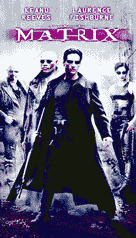
The Matrix -- A Shamanic JourneyReviewed by Tony Cecala, Ph.D.
Despite initial appearances, The Matrix, conceived and directed by Andy and Larry Wachovsky is not your ordinary sci-fi/action film. The Wachovsky Brothers tell the archetypal story of how an unconscious civilization begins to reawaken. They tell of a shamanic journey where the main character, Neo (Keanu Reeves) evolves from being an "ordinary guy" to a fully-awakened being (an Avatar), able to shape reality with his mind. The Matrix is rich in references to Eastern philosophies, Judeo-Christian writings, and the work of Lewis Carroll.
My favorite aspect of the movie is the student/teacher relationship between Neo and Morpheus (Laurence Fishburne). Like Carlos Castenada's shaman, Don Juan, Morpheus takes Neo, to the very edge of his belief system and asks him to go further--in essence--to transcend his mind. Morpheus counsels Neo in a training session, "You have to let it all go, Neo, fear, doubt, and disbelief. Free your mind." Morpheus also approaches each situation (however challenging) with utter certainty as to a positive outcome. In each situation, Morpheus succeeds in creating his preferred reality. (In some indigenous cultures, a child destined to be the tribe's medicine man is raised in isolation by shamans who train the child's mind to have no doubts.) The Matrix is an important film because the scenario of a programmed, meaningless life mirrors present-day earth. Most of us participate, in some part, in a "rat race" -- a life based on timetables, deadlines, and "making ends meet." Morpheus tells Neo, "Most people are not ready to be unplugged. They are so inured3, so hopelessly dependent on the system, that they will fight to protect it." Morpheus makes an important point. The dominant message we receive by corporate media is "work...consume...work more...consume more..." If you were inspired to take on a humanitarian project -- join the Peace Corps, work with troubled youth, start a foundation, or teach a personal growth course -- would you be able to drop your current ties? If you discovered a cure to all diseases would you be seen as a hero, or would you threaten a multi-trillion dollar industry? What part of the current system do you protect? The Matrix won an Oscar® (1999) for special effects and has achieved a loyal following among science fiction lovers and computer programmers (the main characters are hackers; hence, their aliases). The Matrix's dark, driving, explicit soundtrack features tracks from Marilyn Manson, Prodigy, Rob Zombie, and Rage Against the Machine, among others. The Wachovsky Brothers are creating two sequels to The Matrix. I eagerly await them.4 (1) See the article, "Why The Future Doesn't Need Us", for a controversial look at how machines could become the dominant species on this planet. Wired Magazine, April 2000, by Bill Joy (cofounder and chief scientist of Sun Microsystems). http://www.wired.com/wired/archive/8.04/joy.html Joy, a technologist, finds encouragement that we can create a utopia from the Dalai Lama: "Where can we look for a new ethical basis to set our course? I have found the ideas in the book Ethics for the New Millennium, by the Dalai Lama, to be very helpful. As is perhaps well known but little heeded, the Dalai Lama argues that the most important thing is for us to conduct our lives with love and compassion for others, and that our societies need to develop a stronger notion of universal responsibility and of our interdependency...The Dalai Lama further argues that we must understand what it is that makes people happy, and acknowledge the strong evidence that neither material progress nor the pursuit of the power of knowledge is the key - that there are limits to what science and the scientific pursuit alone can do." (2) For that matter, after working 8 hours in front of a computer monitor, many people go home to spend a few more hours in front of a television monitor. What part of these projected realities can we be sure is real? When does electronic media become more real than a walk in the park? Have you ever been fooled by an telemarketer's recorded voice phoning you about "an important message", or a spam e-mail pretending to be from a "friend"? (3) inured : "accustomed to accept something undesirable" (Merriam-Webster Collegiate). (4) For more information about the movie, visit the official web site. http://www.whatisthematrix.com. |